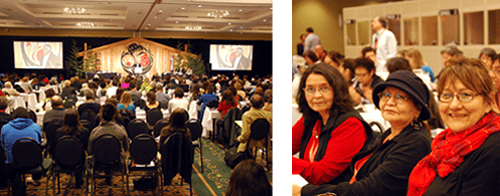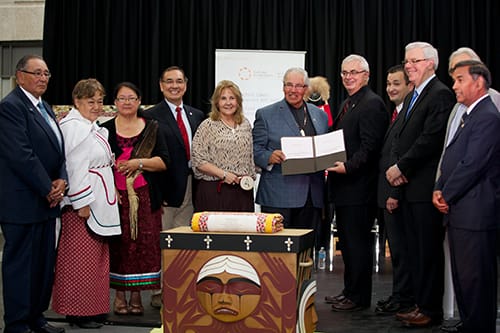Development of the National Centre for Truth and Reconciliation
NCTR History
The history of the National Centre for Truth and Reconciliation (NCTR) at the University of Manitoba (UM) has its roots in the residential schools era itself. As many people began to reassess the role of residential schools in Canada during the late 20th century, former students began to speak publicly about their experiences. In time a class action suit was launched, leading to the Indian Residential Schools Settlement Agreement (IRSSA) which came into effect in 2007.
This agreement involved a number of provisions, including the creation of the Truth and Reconciliation Commission of Canada (TRC). As part of the TRC’s mandate, the Commission was tasked with creating a “National Research Centre” to ensure the preservation of the Commission’s archives after its mandate concluded. The mandate states that this Centre “shall be accessible to former students, their families and communities, the general public, researchers and educators who wish to include this historic material in curricula.”
NCTR Forum
Working toward this part of its mandate, the TRC listened to survivors and other experts, and, in 2011, hosted an international forum to examine how truth and reconciliation commissions around the world have handled the archives they have created.
Following this forum, in 2012 the Commission invited organizations interested in hosting the National Research Centre to submit their proposals. UM, along with a number of partner organizations submitted proposals.

Signing Ceremony

In 2013, the TRC announced that UM’s bid to house the Centre was successful. That year the TRC and University signed a Trust Deed and an Administrative Agreement, and the NRC, now known as the National Centre for Truth and Reconciliation was created.
The Centre is hosted by the university in partnership with other universities, colleges and organizations across the country, and tasked with preserving the memory of Canada’s residential school system and legacy. Not just for a few years, but forever. The Centre’s Governing Circle and Survivors Circle play an important role in ensuring the promises undertaken in these agreements are honoured respectfully.
In 2014 the University began the process of establishing a physical home for the TRC’s records and collections, and for the activities of the NCTR. In November of that year the Centre held a blessing ceremony at its new site, Chancellor’s Hall on the Fort Garry campus.
View the Admin Agreement (PDF)
While the life of the NCTR begins with the statements and documents from the Truth and Reconciliation Commission of Canada, in future, it will house other Indigenous collections. It will also encourage dialogue on the many issues that stand in the way of reconciliation.
Videos from the NCTR Forum and Signing Ceremony
Watch all videos from the NCTR Forum and Signing Ceremony:
NCTR’s spirit name – bezhig miigwan, meaning “one feather”.
Bezhig miigwan calls upon us to see each Survivor coming to the NCTR as a single eagle feather and to show those Survivors the same respect and attention an eagle feather deserves. It also teaches we are all in this together — we are all one, connected, and it is vital to work together to achieve reconciliation.
